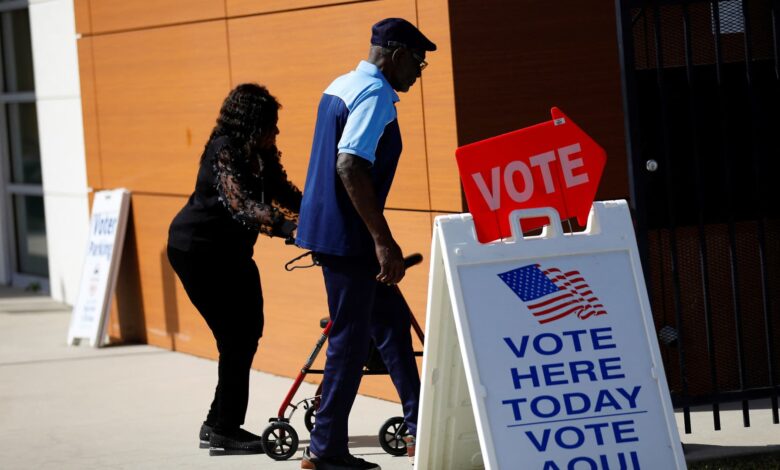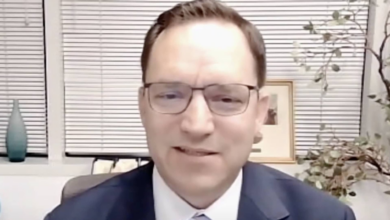Companies brace for Tuesday: Mentions of election surge on company conference calls

Voters walk to cast their ballots during early voting in the presidential election at a polling station at the C. Blythe Andrews, Jr. Public Library in Tampa, Florida, U.S., November 1, 2024.
Octavio Jones | Reuters
Executives at America’s largest companies are talking publicly with investors about the presidential election more so than in recent cycles.
The word “election” came up on 100 earnings calls of S&P 500-listed firms between Sept. 15 and Oct. 31, according to FactSet. That’s the highest number of companies in the broad index mentioning the word during that timeframe, according to CNBC screens of the same period going back to 2004. The U.S. presidential election is Tuesday Nov. 5.
The economy is on the minds of everyday Americans as they head to the polls for what’s shaping up to be a neck-and-neck race between Kamala Harris and Donald Trump. At the same time, white-collar leaders are considering potential policy impacts on their businesses, while lamenting a general uncertainty tied to the political season.
“Because of election uncertainty and a variety of other things, you can feel a little bit of caution out there,” Dover CEO Richard Tobin told analysts on the specialty manufacturer’s earnings call in late October.
FactSet senior earnings analyst John Butters first pointed out the volume of companies discussing elections in recent weeks. Notably, his data found that very few executives of S&P 500 companies mentioned Harris or Trump by name, talking about the race more broadly.
‘Prudent’ clients
Multiple companies cited a feeling of unpredictability tied to the presidential race among consumers and business clients.
At Tractor Supply, CEO Harry Lawton said its customer was expected to remain “prudent” like past election years. That comes after the farm-focused retailer reported a bump in emergency response sales to start the quarter following Hurricanes Helene and Milton.
Southwest Airlines, meanwhile, expects a “trough” in air travel around Election Day, according to operations chief Andrew Watterson. But when it comes to booking trends, Royal Caribbean CEO Michael Bayley said there has historically been no long-term impact from presidential elections, though the cruise line may see some volatility the week of the contest.
Southwest Airlines airplanes are serviced at their gates at Fort Lauderdale-Hollywood International Airport on May 18, 2024, in Fort Lauderdale, Florida.
Gary Hershorn | Corbis News | Getty Images
In addition to Election Day, market participants and business leaders are also closely monitoring the Federal Reserve’s monetary policy meeting next week. Tool maker Stanley Black & Decker CEO Donald Allan listed both the election and interest rates as reasons to anticipate “choppy markets” into the first half of 2025.
Fed funds futures are pricing in a roughly 96% chance of a decrease to the borrowing cost at the November meeting, according to the CME Group’s FedWatch tool as of Friday evening. That comes after the central bank in September issued its first rate cut since 2020.
Stanley Black & Decker’s Allan also pointed out Trump’s policy on taxing imports, noting that America would be “likely in a new tariff regime.” The Republican nominee has said he plans to impose a 20% tax on imports, with an extra high rate of 60% on those coming from China.
William Grogan, CFO of water infrastructure company Xylem, said the election is one factor creating a “little bit of a pause” in the industrial market for big projects. Republic Services CEO Jon Vander Ark said the waste disposal company sees “a little bit of paralysis in an election year,” but he’s optimistic heading into the end of 2024 and start of 2025.
Watching the economy
More broadly, Eric Ashleman CEO of Idex, which makes components for everything from air bags to DNA testing equipment, said the race hasn’t helped the economic backdrop recently.
Nonfarm payrolls grew by the smallest number of jobs in October going back to late 2020 due to hurricanes and the Boeing strike. In this vein, Equifax said it saw softness in background screening volumes as executives consider what the outcome can mean for their businesses.
“Coming into the election, it feels like companies are being a little more prudent about the new hiring,” Equifax CEO Mark Begor said.
To be sure, some of the “election” mentions this year were tied to unrelated events like enrollment periods for health care. Other firms ranging from software company Tyler Technologies to credit card giant American Express said they haven’t felt impacts from the election on the business.
“This company has been around a long time,” American Express CEO Stephen Squeri told analysts last month. “I mean, obviously, we didn’t have cards 174 years ago. But we’ve been around for lots of different elections; lots of different configurations of the House, the Senate and so forth.”
Equity Residential CEO Mark Parrell, meanwhile, said state and local government is considered more important to the business than which party is victorious on the top of the ticket. Indeed, the company is a real estate investment trust that invests in apartments.
Moving forward
Still, this cycle has appeared to engage a uniquely high number of leaders within corporate America’s largest firms. The 2024 mentions count equates to the word “election” during that timeframe coming up on calls of around one in every five companies within the S&P 500. It’s also more than triple the number of references during the same period in 2008.
D.R. Horton is seeing buyers “stay on the sidelines” given the expectation for lower mortgage rates in 2025 and the stress tied to the election, according to CEO Paul Romanowski. The homebuilder is attempting to boost demand by offering mortgage buydowns and focusing on building houses with smaller floor plans, he said.
Another member of D.R. Horton’s C-suite spoke about the election more bluntly.
“I think everybody would be happy the election is over,” chief operating officer Michael Murray told analysts on the company’s earnings call. “I think that will help buyer sentiment and the ability to move forward with their life decision.”



